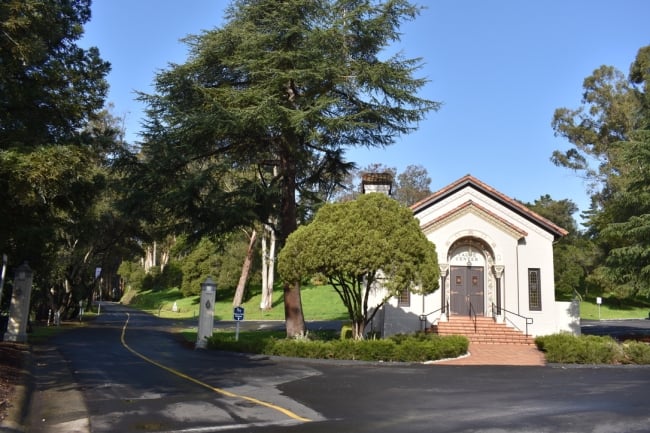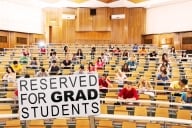You have /5 articles left.
Sign up for a free account or log in.

Notre Dame de Namur University
Notre Dame de Namur University's interim president said a decision announced last Monday not to admit new students is buying time for university leaders to find a way to keep the university open.
Faculty members are less hopeful. One faculty leader described the decision as a temporary stay of execution.
The unsettled situation demonstrates why it's so difficult to close a college or university. Faculty and staff members resist the idea of giving up on their employer's future -- and their own jobs -- too early. Leaders who want to do right by current students and staff are left with few paths forward and are very often criticized for giving up on the colleges they lead.
Similar situations have unfolded in the past. Hampshire College's leaders tried last year to suspend admissions and seek a merger partner, only for alumni to revolt and force the institution to reverse course. Before that, Sweet Briar College leaders attempted to close the college and wind down operations because of poor enrollment and financial trends but were stopped by outraged alumnae.
Both situations were marked by acrimony between college leaders and those fighting to maintain the college's independence. Notre Dame de Namur appears to be different -- at least so far. Faculty have called for many of the university's leaders to resign but said in a letter to interim president Dan Carey, "Dan, you can stay."
Under plans announced last week, current students on track to graduate by spring 2021 will do so, and other students are receiving assistance to transfer to another college. Athletics will be suspended at the end of the current semester. The university will refund deposits for already-admitted students.
“It would be unethical for the university to accept more students,” Carey said, because the university’s financial situation is grim, and staying open is becoming increasingly difficult.
But Notre Dame de Namur did not announce that it’s closing, and Carey refused to speculate whether and when it may shut its doors. Instead, the university is holding out for a solution and stretching what little resources it does have to graduate as many students as possible in the next year and a half.
“Our goal from the very beginning is to do right by everybody,” Carey said. “Our goal is to serve the students in every way that we can and to get them to graduation, instead of just to give up and say, ‘We’re closing.’”
The small, private, four-year university is not alone. Many similar institutions have been facing declining enrollment and upping their tuition discount rates, leaving little cushion between operating expenses and revenue. The new coronavirus has heightened that financial pressure: room and board refunds will create a temporary budget hole in many cases, students will likely require more financial assistance, and universities with small endowments are watching them shrink in the bear market. Together, the pressures could force many institutions to close in coming years.
Notre Dame de Namur's troubles came before the coronavirus outbreak. Nonetheless, it is worth watching to see how the university's leaders and faculty handle financial crises at a time when the global pandemic is quickly shifting the outlook for higher education.
According to Michael Horn, co-founder of the Christensen Institute, Notre Dame de Namur’s approach in winding down its operations is unique.
“I don’t think I’ve seen something quite like this before, to be totally candid,” Horn said. “My sense is that normally schools, Boards of Trustees come together, make some clear plans, figure out teach-out options and make a clear announcement.”
But then this Friday, after Horn was interviewed, MacMurray College in Jacksonville, Ill., followed that format. The college announced that it will close at the end of the spring semester, citing declining enrollment, rising costs and an insufficient endowment.
Carey hopes there’s still time for an intervention. The university is not currently negotiating with any other colleges about a potential merger. That doesn't mean it hasn't explored potential merger options, Carey said. He remains open to the idea.
“We’re buying time to see whether there could be a viable new structure,” Carey said. “What are the odds [of staying open]? I don’t even want to go there. It would take something major.”
In response to a question about rumored merger negotiations between Notre Dame de Namur and the University of San Francisco, USF issued the following statement.
"As two private, not for profit Catholic institutions, among the oldest in California, USF and NDNU had conversations with a goal of serving our students while preserving the legacy of Catholic higher education in the State of California," it said. "After wide-ranging discussions, it became apparent that the current environment did not present a context for a successful relationship. "
Many faculty members at Notre Dame de Namur will not be employed by the spring of 2021. Layoffs are certain, Carey said. How many faculty members will be let go and when such moves will be announced is still undecided.
Faculty are pessimistic.
Vince Fitzgerald, chair of the English department and president of the university's Faculty General Assembly, doesn’t buy in to the university’s optimism.
“The school keeps insisting that we’re staying open, but the pathway we’re on now is the pathway to closure,” Fitzgerald said. “It feels like a temporary stay of execution.”
He estimates that based on the number of returning students, only one-fourth to one-third of the faculty will be retained. The university would not comment on this estimate's accuracy.
Notre Dame de Namur is in negotiations with faculty and staff unions. Carey received a letter from the faculty union SEIU Local 1021 on Wednesday evening. It asks for numerous financial and employment documents and calls for the entire board, the university's chief financial officer and its lawyer to resign.
“We would prefer to do this the easy way, but if NDNU prefers the hard way we can do that too,” wrote Nato Green, campaign coordinator for the faculty union. “These others have to go. Dan, you can stay.”
According to Fitzgerald, the faculty has lost confidence in the board.
“The faculty strongly believes that we need a new board. If the board is not willing to do everything they can to do the heavy lifting to save this institution, then they need to step aside and let other people do it,” he said.
Fitzgerald is hoping to rally for outside help and to forge community partnerships that could keep the institution afloat. The university’s announcement last week could jeopardize those relationships, he said.
“They’ve chosen the pathway where we’ll have no students in May, and that makes it exponentially more difficult to find people who would want to donate to the university,” he said.
Carey is asking for the faculty’s cooperation.
“The bottom line is this,” he said. “If there’s not cooperation, then we might not be able to meet our goal of serving our students.”








